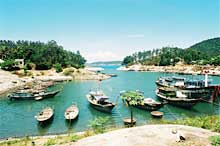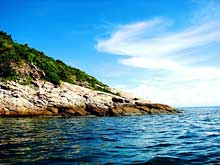The Cu Lao Cham (Cham islands), an isolated archipelago including eight small islands 18km off the coast of Hoi An, are a tourist spot worth discovering.

The islands, which are spread across 15sq.km of sea, can only be accessed by boat. However, visitors have a few different options when choosing their seafaring vessel: the wooden boat travels there in about an hour and a half, the speed boat gets visitors there in 25 minutes or the public boat, which shuttles residents of the Cham islands to Hoi An and back once a day. Visitors usually do not take the public boat, though the one-way ticket costs only 10,000 VND per person.
Before arriving on Hon Lao Island , the largest and only populated island among the island group, the boat will stop at Bai Xep beach to offer visitors a chance to see the white coral reef through the boat’s glass-floor. But nothing can compare to the real experience of swimming in the clear water over the reef, which is only one metre below the water’s surface - almost close enough to touch. So don’t hesitate to jump off the boat into the blue water and enjoy.
The richness of different coral species and other marine creatures has brought the Cham islands to be included in the World Biosphere Reserve. At present, there are 135 species of coral, including six species first recognised in Vietnam, and nearly 950 other marine species living in the seabed of the archipelago, including many endangered species on the Vietnam Red Book list.
Fishing is the main occupation of almost 3,000 local people living on the Cham islands. However, in order to protect the archipelago’s eco-environment, the Quang Nam provincial authority has encouraged islanders to fish further offshore. While visiting the island, tourists will have a chance to taste many different kinds of seafood, some of which are unique to the area, such as lobster, oc vu nang (a kind of conical-shape snail), diep (a type of shellfish) and abalone. Another local speciality is cua da – a kind of crab which lives in small mountain caves. The flesh of the small purple crab tastes like butter.
Another natural resource that brings money to local islanders is the harvest of swallow’s nests. Every year, islanders harvest from 1-1.4 tonnes of the bird’s nests, which cost around 4,000 USD per kilo. Yen Island is home to the swallows, but visitors are not allowed to set foot on the island. Instead they can visit the temple worshipping the ancestor in charge of bird nest exploitation on Hon Lao Island.
There are many other spots worth seeing on Hon Lao Island. A tour guide will show visitors a small bay where local fishing boats go for shelter during storms or other natural disasters. The bay was built right after the historical typhoon in 1989, which extensively damaged fishermens’ property.
The ancient Hai Tang Pagoda, built in 1758, is another must-see spot. The 250-year-old pagoda is unique because it is dedicated to the worship of three different religions: Buddhism, Taoism and Confucianism. While sipping a cup of herbal tea offered by an elder Buddhist woman, visitors can experience the calm of the scenery as well as of their own spirit.

Walking through the Bai Huong fishing village, visitors can learn about local life by watching local fishermen mend fishing nets and drying fish and squid, or they can go fishing themselves on a tour held on a local fishing boat. Visitors can also buy seafood at a reasonable price for a meal on Bai Chong Beach.
At Bai Chong Beach, arguably the most beautiful beach on the island, visitors should enjoy the island with all five senses: listening to the sound of the wind in the leaves and the waves crashing on the shore, breathing in the salty smell of the air, capturing the scenery with their eyes, touching the smooth white sand and tasting the island’s specialities.
A warning for swimmers: sometimes stinging jellyfish can be found floating off the coast.
Those who want to spend the night on the island can pitch a tent right on the beach and enjoy sleeping under the stars.
Cu Lao Cham offer visitors a chance to discover nature’s beauty and escape from the stress of modern life.